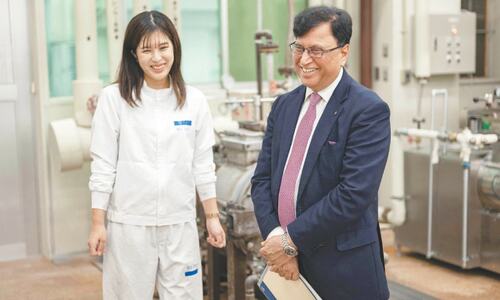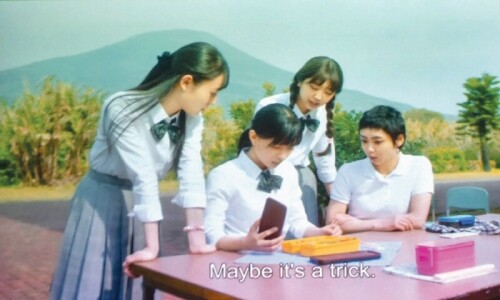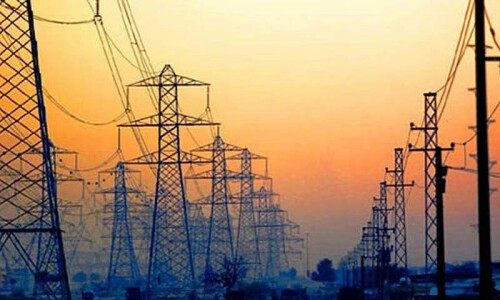KOZLODUY (Bulgaria): Restarting two Soviet-era reactors at Bulgaria’s sole nuclear power plant would be “a triumph of justice” for Hristophor Gerdzhikov.
The engineer who takes care of one the closed units, as well as a majority of Bulgarians, have applauded the government plan to seek a relaunch of the shuttered plants as compensation for damage caused by last month’s cut-off in Russian gas supplies.
But observers and some politicians say the move by the Socialist-led cabinet is a bluff and a gamble.
Besides conjuring images of Ukraine’s Chernobyl nuclear disaster in 1986, they argue it is a ploy to stoke a nationally sensitive subject and revive plunging support ahead of parliamentary elections likely in July or August.
Opinon polls show over 70 per cent of Bulgarians want the government to resign, and the Balkan country has been hit by a wave of protests with students, farmers, doctors and public workers saying they are fed up with life in the European Union’s poorest and most corrupt nation.
But, on the other hand, over 70 per cent of 7.6 million Bulgarians view Kozloduy as a symbol of national pride. People say shutting the reactors two years ago was too high a price to pay for membership of the wealthy bloc.
Gerdzhikov, who was part of the team that closed down the units on Dec 31, 2006, a day before Bulgaria joined the EU, said he would be more than happy to put them back online.
“They are perfectly safe and it was not fair to close them down,” said the bespectacled man during the restart of the tests in the unit’s control centre.
The Socialist-led government says the reactors were unfairly deemed dangerous by the EU and has called on Brussels to compensate Bulgaria for the double blow of the gas row and the global economic slowdown, by allowing a restart.
A two-week cut-off in Russian gas supplies over a price dispute between Russia and transit country Ukraine exposed Bulgaria’s huge reliance on Russian gas and left hundreds of thousands without heating in the depth of winter.
On the streets of the sleepy Danube town of Kozloduy, some 200 km north of Sofia, discontent is still palpable.
“The government doesn’t do anything for the good of Bulgaria,” said Yordan Borisov, 59, a musician. “The situation is getting worse. Our children keep going abroad.”
Political gambling
Analysts and politicians from a junior party in the ruling coalition say economic logic has little if anything to do with the Socialists’ real motives.
“If the government wants to unlock any energy with Kozloduy, it’s not nuclear energy but political energy and an attempt to mobilise its electorate,” said Ivan Krastev of the Sofia-based Liberal Strategies Institute.
“I don’t think they actually plan to reopen the units,” he added. “The trouble with such bluffs is that when the time comes to show one’s cards, the bluff becomes very dangerous.”
All signals from Brussels have so far clearly indicated that any restart attempt would fail, not least because of opposition from traditionally anti-nuclear countries like Austria.
The EU executive Commission, which also made Lithuania and Slovakia become committed to shutting down Soviet-made reactors as a condition of membership, has repeatedly said there is no evidence the units meet the bloc’s safety standards.
Fellow ex-communist state Slovakia, which was also badly hit by the gas disruption, decided in January to restart a reactor it had closed in late 2008, but abandoned the plan after Brussels warned of legal action.
The government in Sofia nevertheless ordered Kozloduy to launch technical preparations for a restart, while parliament gave ministers a mandate to seek permission from Brussels.
Opposition parties and the ex-king Simeon’s centre-right NMSP, a junior partner in the coalition, say the real goal is to divert attention from Bulgaria’s entrenched problems such as corruption and the job losses that a global slowdown will bring.
Bad example
Pushing ahead with the reactor plan could further harm relations with the EU, which cooled last year after Brussels froze millions in aid over graft.
Analysts also say the precedent would be dangerous.
“You cannot use a crisis to change every-day direction,” said Stephan Werthschulte, managing partner with consultants Accenture. “Then Germany can say, ‘forget about the carbon dioxide emissions, we will reactivate the old coal plants.’
“That would lead to chaos,” he added.
They argue Bulgaria should instead tackle the root of the problem – its heavy dependence on Russian energy.
Dozens of factories were forced to close during last month’s gas shutoff and the government estimated direct company losses at some 500 million levs ($331 million).
Closing the two 440-megawatt units at Kozloduy has also cost Bulgaria 350 million euros in lost revenues in the past two years – more than the 270 million euros promised by the EU in compensation, the plant’s management says.
Worsening power deficits in the western Balkans, which depended on Bulgaria to make up for their own shortages, are another argument put by Sofia to support a restart.
That position is undermined by the fact that even during the gas crisis, Bulgaria continued to export electricity.
Not Chernobyl type
Political haggling aside, many scientists say the two VVER units could operate safely for another eight to nine years and have been wrongly associated with Chernobyl type reactors.
They point to a 2002 evaluation by the International Atomic Energy Agency, according to which the units had been upgraded to levels seen at similar vintage plants elsewhere in the world.
“There will be people who say these are old Soviet reactors, they are very dangerous and all that. But after Chernobyl all these reactors were upgraded significantly,” said Luis Echavarri, director general of the OECD’s Nuclear Energy Agency.
“It’s feasible to operate these reactors for some more years in good safety conditions.”
Kozloduy has maintained the reactors – units three and four whose decommissioning could take up to 10 years – in good shape since 2007 and can restart them in 30 days.
International concern about the plant grew in 1991, when Bulgaria temporarily shut its two oldest reactors over fires and leaks after the plant was neglected under communism.
It permanently shut the two oldest units – one and two – in 2002 and invested over $300 million to modernise units three and four. Two other 1,000 MW reactors – blocks five and six – will stay online at least until the end of the next decade.
Kozloduy’s executive director Ivan Genov has no big hopes of a positive answer from Brussels: “The shutdown was the result of bad negotiations and failing to protect Bulgaria’s interests,” he said.—Reuters














































Dear visitor, the comments section is undergoing an overhaul and will return soon.